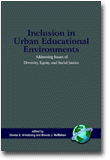
Inclusion in Urban Educational Environments
Addressing Issues of Diversity, Equity, and Social Justice
By:
Denise E. Armstrong, Brock University
Brenda J. McMahon, The University of North Carolina at Charlotte
A volume in the series: Issues in the Research, Theory, Policy, and Practice of Urban Education. Editor(s): Denise E. Armstrong, Brock University. William S. Ankomah, St. Francis Xavier University, Canada.
Published 2006
This book is motivated by our experiences in working with students and their families in urban communities. We are particularly concerned about the urgent imperative to address the endemic educational and societal challenges that pervade the lives of urban students, particularly those who live in poverty, are of minority and immigrant backgrounds, and are otherwise marginalized within the current educational discourses and practices. In spite of the fact that over the last 3 decades policy makers, educators and communities across the globe have called for in depth structural changes, this is rarely evidenced in the discourses, practices, and structures within academic and practitioner spheres. This reluctance, despite articulations to the contrary, can be directly linked to normative theoretical and practical perspectives that are defined by assumptions that constrain urban students within restrictive boundaries. These narrow outsider worldviews based on notions of what ought to be, combined with ignorance of the realties of students’ lives focus on deviance and deficits. They blind prospective change agents to the strengths and richness that students bring, and they delimit the transformative potential of social justice praxis within urban environments. The resulting discourse, in the form of deficit beliefs, thoughts, actions, and dialogues shapes urban research, theory, and practice. We contend that in order to counteract the debilitating impacts of these harmful constructions of urban and social justice, it is important to clarify this terminology.
CONTENTS
Acknowledgments. Introduction. PART I: INTERSECTING EXCLUSIONS WITHIN SCHOOL CULTURE. Exclusion in Urban Schools and Communities, Jim Ryan. Understanding School Culture: In/Exclusion Within Yearbook Discourses, Rene Antrop-Gonzalez, Debra Freedman, Jennifer L. Snow-Gerono, Anne L. Slonake, Pey-chewn DuoPeychewn Duo, and Hsiu-Ping Huang. PART II: SOCIOECONOMIC STATUS AND ABILITY. Reflecting on Mary H. Wright Elementary: Ideologies of High Expectations in a “Re-Segregated" School”, Susan L. Schramm-Pate, Rhonda B. Jeffries, and Leigh Kale D’Amico. Seeing the Glass as Half Full: Meeting the Needs of Underprivileged Students Through School-Community Partnerships, Catherine Hands. Flipping the Special Education Coin: The Heads and Tails of Administering Schools for Students with Different Needs, Lindy Zaretsky. PART III: GENDER AND SEXUAL IDENTITY. Gender: A H.O.T. (Higher Order Thinking) Link in Educating Urban Students, Amy Barnhill. LGBTQ Students in Urban Schools: Sexuality, Gender, and School Identities, Dominique Johnson. My Favorite Martian: The Cry for Visibility of Sexual Minorities in Urban Schools, Kevin Alderson. Urban Girls Empowering Themselves through Education: The Issue of Voice, Gunilla Holm and Bill Cobern. PART IV: RACE AND ETHNICITY. Black Boys Through the School-Prison Pipeline: When “Racial Profiling” and “Zero Tolerance” Collide, R. Patrick Solomon and Howard Palmer. White Fragility: I’m Leaving, Robin DiAngelo. Anne Frank Teaches Teachers About the Holocaust, Leslie Shore. Addressing Multicultural and Antiracist Theory and Practice With Canadian Teacher Activists, Darren Lund. PART V: TOWARD INCLUSION IN SCHOOLS AND COMMUNITIES. Support That Matters: A Case Study in Raising the Achievement of Economically Vulnerable Youth, Norman Rowen and Kevin Gosine. Framing Equitable Praxis: Systematic Approaches to Building Socially Just and Inclusionary Educational Communities, Brenda J. McMahon and Denise E. Armstrong. About the Authors.
REVIEWS
"Armstrong and McMahon have compiled a great resource for understanding the complexity of urban education and the ways in which students are marginalized and excluded through structural ideologies, policies, and practices within schools. The easy-to-read format is ideal for exploring conversations and dialogue among researchers, policy makers, community leaders, and practitioners interested in education reform." Angeles Maldonado Arizona State University in Education Review (Read full review)
-
Paperback978-1-59311-493-0
Web price: $45.04 (Reg. 52.99)
-
Hardcover978-1-59311-494-7
Web price: $80.74 (Reg. 94.99)
- eBook9781607527206

- EDU016000 - EDUCATION: History
- EDU037000 - EDUCATION: Research
- SOC026030 - SOCIAL SCIENCE: SOCIOLOGY: Urban
-
 Convictions of Conscience
How Voices From the Margins Inform Public Actions and Educational Leadership
Convictions of Conscience
How Voices From the Margins Inform Public Actions and Educational Leadership
-
 Leadership from the Ground Up
Effective Schooling in Traditionally Low Performing Schools
Leadership from the Ground Up
Effective Schooling in Traditionally Low Performing Schools
-
 Schools as Radical Sanctuaries
Decolonizing Urban Education through the Eyes of Youth of Color
Schools as Radical Sanctuaries
Decolonizing Urban Education through the Eyes of Youth of Color
-
 Struggling for Inclusion
Educational Leadership in a Neo-Liberal World
Struggling for Inclusion
Educational Leadership in a Neo-Liberal World
-
 Student Engagement in Urban Schools
Beyond Neoliberal Discourses
Student Engagement in Urban Schools
Beyond Neoliberal Discourses
-
 Teach & Thrive
Wisdom from an Urban Teacher's Career Narrative
Teach & Thrive
Wisdom from an Urban Teacher's Career Narrative
-
 Working (With/out) the System
Educational Leadership, Micropolitics and Social Justice
Working (With/out) the System
Educational Leadership, Micropolitics and Social Justice

